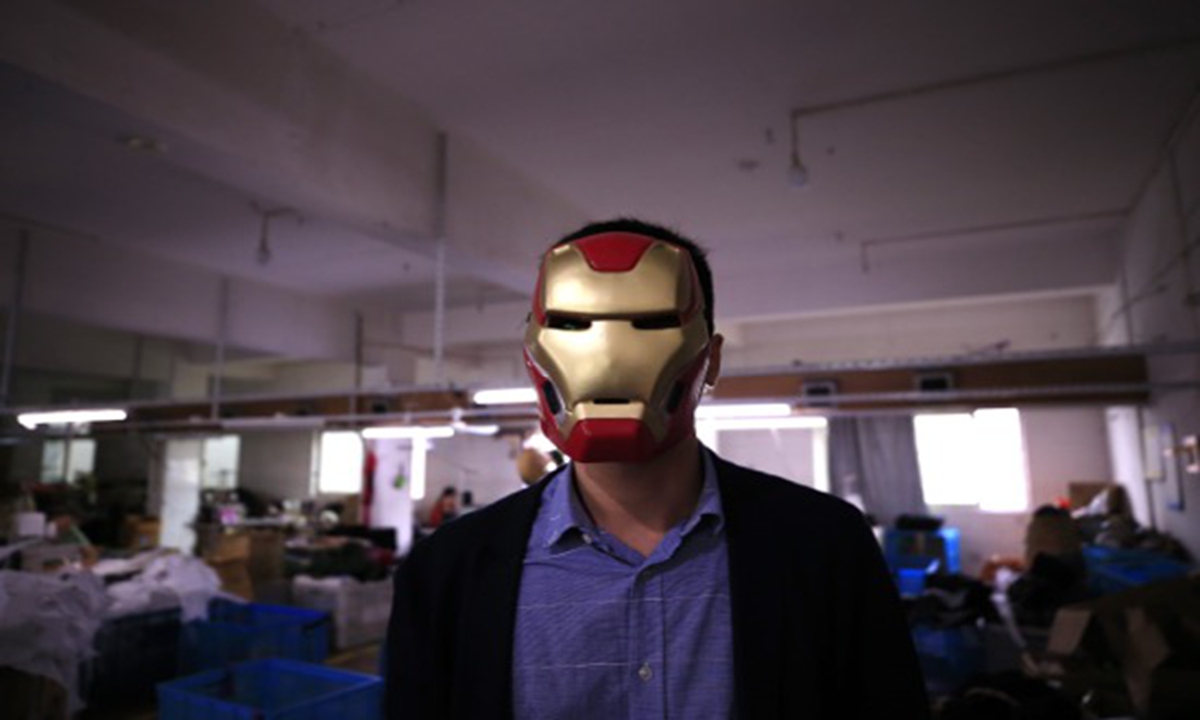China-US decoupling not in the works
By Xie Jun Source: Global Times Published: 2020/9/28 21:21:29
Tariffs, pandemic can’t cut interdependence

The manager of a plant in China's manufacturing hub Yiwu wears an Iron Man mask. The plant will export tens of millions of festival masks and toys to the US for the Halloween holiday. Photo: Yang Hui/GT
The Trump administration will be frustrated to find that interdependence between the US market and Chinese manufacturing can't be easily divided, no matter it is tariff hike, call for US businesses to decouple from China, or the coronavirus outbreak, which battered both economies badly.
As the Chinese economy rebounds from the disease, it is again churning out products for the rest of the world, including the US, where the coronavirus is still not under effective control.
At a plant specializing in making festival masks and other holiday gifts in Yiwu, East China's Zhejiang Province, dozens of workers were making masks and sewing cloth together to make toys. About 90 percent of the products will be shipped to the US, sold at supermarkets and websites like Walmart, Target and Amazon for the upcoming Halloween.
At the plant, the Global Times saw many famous US pop culture masks such as Iron Man and Hulk. Last year, the plant sold tens of millions of masks to the US with sales amounting to about $6 million.
"About 90 percent of the world's festival masks are made in China. India also exports a limited number of masks, but their products cost more money," Ye, head of the plant, told the Global Times.
According to Ye, because of disruption from the coronavirus, US clients have postponed some orders. In past years, they usually sent orders from December to April. This year, orders didn't come until around March.
"Our exports to the US slipped by around 40 percent this year. That's not too bad, as our production period was shortened as well this year because of production halt due to the coronavirus, and we actually can't accept more orders," Ye said. The factory had to hire extra packaging staff at the peak period in July and August.
Another Yiwu-based vendor, who exports daily necessities such as rags and towels to the US, noted that US orders started to resume gradually since early August.
"Due to the pandemic, orders from the US are smaller, but we haven't lost any of our old customers," Yu Zhengdong, head of the Chen'ge Daily Supplies, told the Global Times.
China's exports to the US slipped 0.5 percent to 1.87 trillion yuan ($274.31 billion) in the first eight months this year, customs data showed.
The US government has been attempting to dissuade its businesses from purchasing made-in-China goods, pushing to rip global supply chains from China, and adding tariffs on Chinese products. But for many industries, it didn't work, as US purchasers could still make decent profits from selling goods sourced in China.
According to Ye, his plant's masks are facing higher US tariffs. Some of them, such as masks equipped with LED lights, saw import tariffs rise 25 percent. But despite rising cost, the US retail prices of masks from Ye's plant are still three times the wholesale prices, so US buyers can earn a gross profit almost double the import price, Ye disclosed.
Ye added that US clients have little choice but from purchasing from Chinese companies, as most festival masks are made in China. "Other countries often lack the kind of materials or techniques to produce the masks, whether they be plastic stripes or spray-painting, because they lack complete industry chains like those in China," Ye said.
Chinese companies can't sit back and relax, though, since challenges are mounting, such as a toughening trade environment and ballooning labor costs.
Ye used to pay workers about 1,000 yuan per month, but now the wage is at least 4,000-5,000 yuan. "We have no choice but to raise product prices," he said.
Yu's company is also trying to improve the quality of its products — for example, making cleaning rags anti-bacterial — to remain competitive.
Businesspeople in Yiwu also said that for simple products that are low in added value, some Chinese plants are moving to neighboring countries where labor is much cheaper.
Ye said he is still optimistic that mask orders from US will rebound after the pandemic, as there's always demand for the items. But as industry chains improve in other countries, some orders may move as well in the long run.
Newspaper headline: Decoupling not in the works
Posted in: ECONOMY